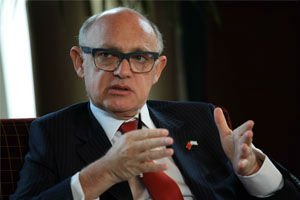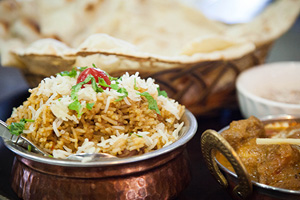Visionary leader honored for work on cross-Straits ties
Updated: 2013-11-14 11:29
By Chen Weihua (China Daily USA)
|
||||||||
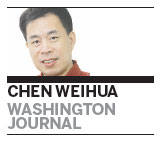 Lien Chan, the honorary chairman of Taiwan's Kuomintang (KMT) party, was presented a Lifetime Achievement in Cross-Strait Relations Award by the US-China Policy Foundation in Washington on Tuesday night.
Lien Chan, the honorary chairman of Taiwan's Kuomintang (KMT) party, was presented a Lifetime Achievement in Cross-Strait Relations Award by the US-China Policy Foundation in Washington on Tuesday night.
However, Lien reminded the audience that former General Secretary of the Communist Party of China Hu Jintao is equally, if not more, deserving of the honor. Lien expressed that this was not just his opinion, but the view of many others.
As Lien, then chairman of KMT, made the icebreaking trip to the Chinese mainland in April 2005, it was Hu, then the head of the Communist Party Central Committee, who extended the invitation amid escalating tensions across the Straits. Their meeting was the first in about six decades since top KMT and CPC leaders had met.
Over the years, many Chinese have believed that both Lien and Hu should win the Nobel Peace Prize for their contribution in reducing hostility and promoting peace and stability across the Straits.
Chas Freeman Jr, a China hand, described Lien's bold decision in 2005 as transforming the cross-Strait relationship.
While there was no contact between the Chinese mainland and Taiwan for decades, Taiwan businesses have now invested $130 billion in the Chinese mainland economy.
Two-way trade approached $150 billion in the first three quarters of this year, up 23 percent over the same period last year, according to the Ministry of Commerce.
Freeman cited the increasing exchanges across the Straits as testimony to the transformation. In 2012, about 5.3 million people from Taiwan traveled to the Chinese mainland as tourists while 2.5 million people from the mainland visited Taiwan. There are nearly 100 direct flights every day between cities on the Chinese mainland and Taiwan.
Meanwhile, some 16,000 students from Taiwan are enrolled in Chinese mainland universities and 1,000 students from the Chinese mainland are attending universities in Taiwan.
"History will recognize his (Lien's) role," Freeman said.
Lien made that historic trip in a troubling time. It was after he lost a controversial "presidential" election in Taiwan in March 2004 to the pro-independence Democratic Progressive Party (DPP) leader Chen Shui-bian.
Chen, who became Taiwan's leader in 2000, had been pushing to change the official name of Taiwan, write a new constitution and launch a campaign to join the United Nations under the name of Taiwan. In Lien's view, Chen was pushing for independence.
To respond to the provocation, the National People's Congress, China's legislature, passed an anti-cessation law in March 2005, a month before Lien's trip. The law states it will not rule out the use of force when Taiwan moves toward independence.
"The KMT, of which I had the honor to serve as chairman at the time, believed we had to do something, to defuse the tension, and, more importantly, to ensure that the outside world understood that there is a rational and more modest voice that represented the majority of the people on Taiwan," Lien said.
Lien emphasized repeatedly on Tuesday that his trip was "a journey of peace", "to turn around the deteriorating relations across the Taiwan Straits" and "to ensure stability and establish a win-win relationship between the two sides of the Taiwan Straits."
"I was convinced that the tide of history was irreversible," Lien said.
Lien and Hu reached five points of consensus during a week-long trip: to push for a resumption of cross-Straits dialogue; to stop hostilities; to have comprehensive economic exchanges; to consult on Taiwan's participation in international activities; and to establish a regular platform for party communications.
Lien was proud that those types of exchanges and cooperation - from economic, trade and agriculture to tourism and education - have developed by leaps and bounds since KMT returned to power in Taiwan in 2008. The two sides signed the Economic Cooperation Framework Agreement (ECFA) in June 2010 that helps to reduce tariffs and commercial barriers between the two sides.
"They dissolved the cross-Straits hostilities and confrontation and transmuted it into cross-Straits cooperation and exchange," said the 77-year-old Lien, with his wife Fang Yu sitting in the audience.
Lien has since continued to play an active role in cross-Straits relations. He made a trip to the Chinese mainland in February, meeting the new CPC General Secretary Xi Jinping.
"I proposed some suggestions for cross-Straits relations, mainly One China, cross-Straits peace, mutually beneficial economic integration and the rejuvenation of the Chinese nation," said Lien.
Contact the writer at chenweihua@chinadailyusa.com
(China Daily USA 11/14/2013 page2)
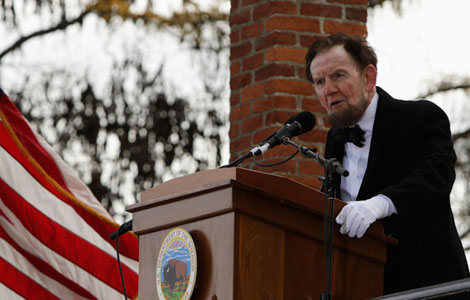
 150 years later, Lincoln's speech long remembered
150 years later, Lincoln's speech long remembered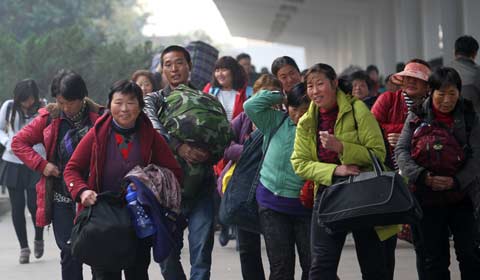
 Rural migrants set to benefit from country's urbanization reform
Rural migrants set to benefit from country's urbanization reform
 Girl's killer gives new evidence
Girl's killer gives new evidence
 Harbin hit by heaviest snowfall since records began
Harbin hit by heaviest snowfall since records began
 Investing in rural teachers paying off
Investing in rural teachers paying off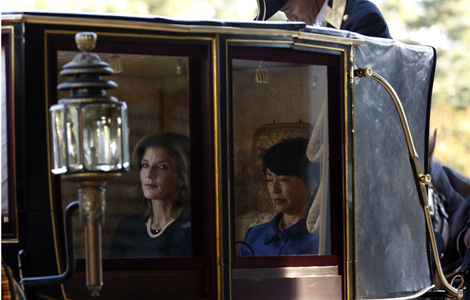
 US envoy to Japan Caroline Kennedy meets emperor
US envoy to Japan Caroline Kennedy meets emperor
 Luxury car auction to be held in US
Luxury car auction to be held in US NASA launches robotic explorer to Mars
NASA launches robotic explorer to Mars
Most Viewed
Editor's Picks

|

|

|

|

|

|
Today's Top News
150 years later, Lincoln's speech long remembered
China's climate mindset achanging game
Petitioners to get third chance for grievances
In Asia-Pacific, HIV still high
PBOC to let yuan float more freely
China 'a strong Games candidate'
Chinese Vice-Premier visits Chicago
Chinese expect lower house prices from reforms
US Weekly

|

|
